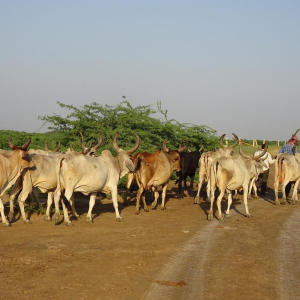
This paper examines how uncertainties and assumptions behind assessments of global livestock methane emissions play out as research is translated into policy. The authors argue that the simplification of emissions data (during the aggregation of life cycle analyses into global sectoral estimates) results in a misleading and narrow picture of ruminant livestock.
For example, very few studies of ruminant emissions (via respiratory chambers) are based in Africa, being instead based on large animals North America and Europe. Hence the results do not take into account the different emissions profiles of ruminants that may be smaller and adapted to certain local feeds and climates. Simplified policy narratives and media reporting of research often fail to reflect the complexity of and differences between various livestock systems.
Furthermore, say the authors, it is important to look beyond the narrow metric of carbon emissions, and use a holistic lens that accounts for biodiversity, landscapes, livelihoods and so on. The authors are particularly concerned that pastoralists are unjustly lumped together with intensive livestock production systems. The result is that the potential of extensive grazing to enhance biodiversity and protect against wildfires is overlooked in favour of the “rewilding” narrative that seeks to free up land from agricultural use.
The authors recommend:
- Differentiate between livestock production systems.
- Use a holistic systems approach to assess all costs and benefits.
- Interrogate the framings used by different actors.
- Question the modelling approaches and priorities behind life cycle assessments.
- Conduct emissions assessments of a greater range of livestock systems.
- Pay more attention to the politics of “whose knowledge counts” in assessing the environmental impacts of agriculture.
The paper is based on the report Are livestock always bad for the planet?
Abstract
The relationship between livestock production and climate change is the subject of hot debate, with arguments for major shifts in diets and a reduction in livestock production. This Perspective examines how global assessments of livestock-derived methane emissions are framed, identifying assumptions and data gaps that influence standard life-cycle analysis approaches. These include inadequate data due to a focus on industrial not extensive systems; errors arising due to inappropriate emission factors being applied; questions of how global warming potentials are derived for different greenhouse gases and debates about what baselines are appropriate. The article argues for a holistic systems approach that takes account of diverse livestock systems—both intensive and extensive—including both positive and negative impacts. In particular, the potential benefits of extensive livestock systems are highlighted, including supporting livelihoods, providing high-quality nutrition, enhancing biodiversity, protecting landscapes, and sequestering carbon. By failing to differentiate between livestock systems, global assessments may mislead. Inappropriate measurement, verification and reporting processes linked to global climate change policy may in turn result in interventions that can undermine the livelihoods of extensive livestock-keepers in marginal areas, including mobile pastoralists. In the politics of global assessments, certain interests promote framings of the livestock-climate challenge in favour of contained, intensive systems, and the conversion of extensive rangelands into conservation investments. Emerging from a narrow, aggregated scientific framing, global assessments therefore can have political consequences. A more disaggregated, nuanced approach is required if the future of food and climate change is to be effectively addressed.
Reference
Scoones, I., 2022. Livestock, methane, and climate change: The politics of global assessments. Wiley Interdisciplinary Reviews: Climate Change, p.e790.
Read the full paper here. See also the TABLE explainers Methane and the sustainability of ruminant livestock and Agricultural methane and its role as a greenhouse gas.







Post a new comment »